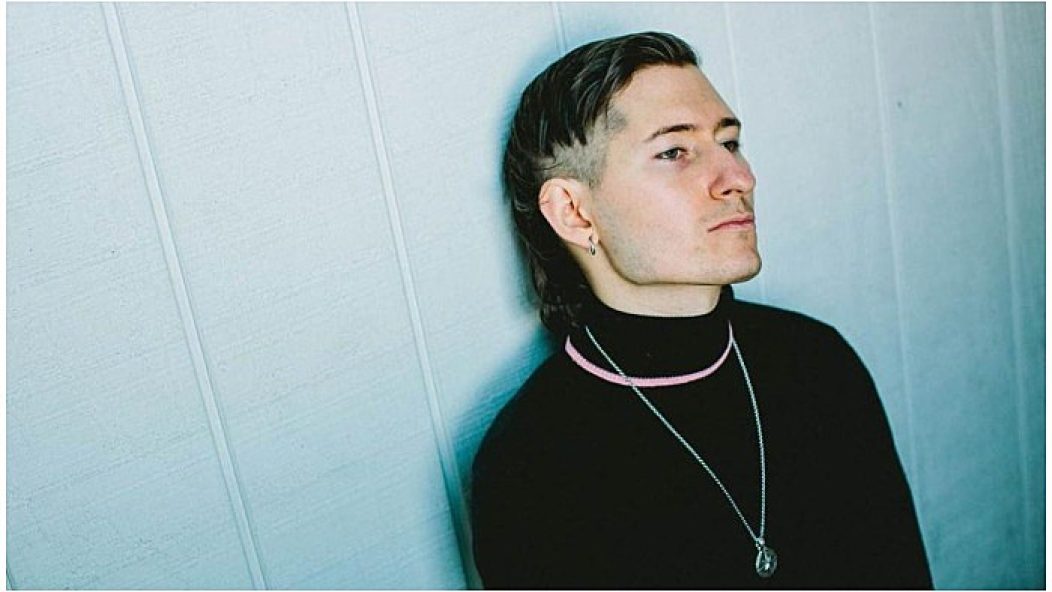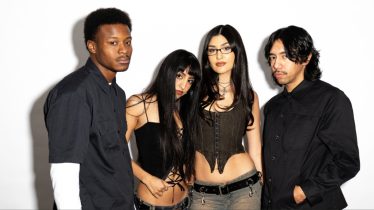
nothing,nowhere's new album is unpredictable, and that's how he wants it
There’s a remarkable difference between taking two weeks to complete a project and taking two years. With two years, there’s more time to learn, grow and excel at your craft. There’s also more time to experience life. That’s the process that nothing,nowhere. (Joe Mulherin) landed on for his latest LP, Trauma Factory.
The Massachusetts-born emo-rap-rock riser was in a position where a series of panic attacks interrupted his music career. After stepping back for some time, he used that experience to make a project which, he hopes, will thank those who stood by him during the wait.
Read more: Alexi Laiho’s posthumous EP with Bodom After Midnight is on the way
“Not long after [my 2018 ruiner project], I had to step away from touring and music for a while because I was having a lot of panic attacks and dealing with my panic disorder,” Mulherin says. “So that anxiety and depression really hit hard for a minute. So that was the last time I put out an LP. And Trauma Factory is me coming back into music and putting out a full-length project once again with more material than ever to write it in terms of what’s been going on in my life and all that. It’s definitely helped me. If I didn’t have music, I guess I’d have to find something else to do to release the emotions and all that.”
Read more: QUIZ: Do you remember the lyrics to these 2000s post-hardcore songs?
With Trauma Factory entering the world Feb. 19 via Fueled By Ramen, he continues to push music that doesn’t align with a single sound. And this time, Mulherin’s using his lived experiences from one of the most difficult points in his life to create whatever the hell he wants. It makes for his most “unpredictable” effort yet.
When did you start recording this one, and what, for you, kicked off the process?
I think the oldest track on there is from late 2018, early 2019. So it’s almost been two years, which is weird for me. When I first came up on SoundCloud, I would make a song, and I would post it the same day. It’s weird sitting on so many songs. And it came to a point where I had over a hundred songs for the project, and I obviously narrowed them down into what is now Trauma Factory. But I like being experimental with the process as well. With ruiner, I made that LP in two weeks, and I made this LP in two years. Different modes of thought and it just keeps things fresh.
In the title-track intro, we hear human life called a “trauma factory.” Can you break this down and why you felt a spoken-word intro was perfect for a record of this nature?
It’s harking back to the days of what I used to listen to. Growing up listening to Sunny Day Real Estate, Braid and American Football and then going into second-wave emo. Listening to Thursday. Especially with Alexisonfire, I remember hearing those types of moments on albums and them really resonating with me. Sitting in the back of the school bus, just listening to these spoken-word moments on these post-hardcore and emo albums. I just wanted to do that. I made it a point to do that on my records—ruiner started with something similar. I think I just wanted to write a poem. I had this idea to state what it was about, and the whole thing about human life being a trauma factory is inspired by Buddhism. Buddhism is stating that human life is suffering, but it’s not looking at it in such a bleak [way] like I used to. Human life is suffering, but it’s beautiful to be able to feel any emotions at all. And knowing that human life is suffering, that’s knowledge. There’s some type of comfort in that, knowing that everyone suffers. It’s not just you.
You mentioned it a bit in the track, but is it hard to balance this new role of being an inspiration for these fans?
I had a stretch of time where there was a lot of pressure because when you have people looking up to you and you’re someone in a spotlight or under a microscope, you almost want to be perfect. You want to show people that you’re perfect. But obviously, we know that no one’s perfect. We’re all human beings with our own faults. And so being someone who struggles with mental illness, I want to be a beacon of light to these other kids who are struggling. But I know now that I’m only human, and I can’t always be this beacon of light or a perfect example of what a recovered ex-depressed or ex-anxious person looks like. So I think early on, I put so much pressure on myself to display an almost fabricated version of myself. Like, “OK, I’m better now.” But these days, I realize that it’s OK to just stay vulnerable. You don’t get better overnight. It’s a journey—the path to peace is a journey.
On this journey toward being yourself, you’re also taking a journey sonically. How would you describe what you’ve been able to do on this project?
I just said, “Screw it, I want to make an album that sounds rad, and I don’t care if the songs mesh. I don’t care if the whole project flows a certain way. I don’t care if it lands on a certain playlist or whatever.” I listen to so much music in so many different genres. I just want to make music for the sake of making music and put it in an album format and put it out there. I always used to get so caught up in “What will the old fans think, or what will the new fans think, or what will the critics think?” Now, it’s just like a band here on Earth to make some art. And I’m not going to overthink it. I’m just going to have fun with the process and just make music because that’s what I love to do.
When you work now, and as you look to mix things up even further sonically and conceptually, how often does the legacy of Fueled By Ramen come to mind?
I think about what label I’m on all the time. I grew up in Foxborough, Massachusetts. Now I live in Vermont. Growing up listening to the music that I did and then ending up on Fueled By Ramen would be the same thing as a kid playing football, loving the New England Patriots and then becoming the quarterback of the New England Patriots or just playing for the New England Patriots. And it’s just one of those things where I don’t think I knew that it would happen. When I was growing up, I always knew that I could do something and I could become something. But I always did have that self-doubt. So the fact that I am here now on [this] label is one of those really bizarre full-circle things that makes me really wonder if you can manifest things. Is destiny a real thing, or is this just a coincidence? I just worked really hard to get here. I don’t know what it is, but it’s a trip. I do think about it every day.
What do you feel the biggest takeaway will be from Trauma Factory, either thematically or as a whole?
Don’t be afraid to follow your gut and follow your intuition. Don’t be obsessed with what other people think of you. And just create from the heart. Art isn’t meant to be one way or the other. And on a broader scale, lyrically, obviously there’s some vulnerable stuff in there because it’s me. But it’s OK to have bad days. I was driving the other day, and I saw a sign that said “Every storm eventually has to run out of rain.” And I thought that was really cool because that’s just how I’ve been feeling lately. I may not be exactly where I want to be, but every day is a journey. I think Trauma Factory, lyrically, conveys that. And I hope that people can find comfort in listening to it and just know that life is a process, and you’ll get to where you want to be eventually.
You can read the full interview in issue 390, available here.







